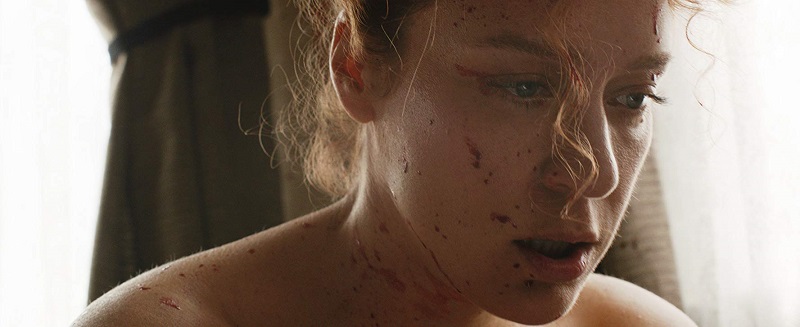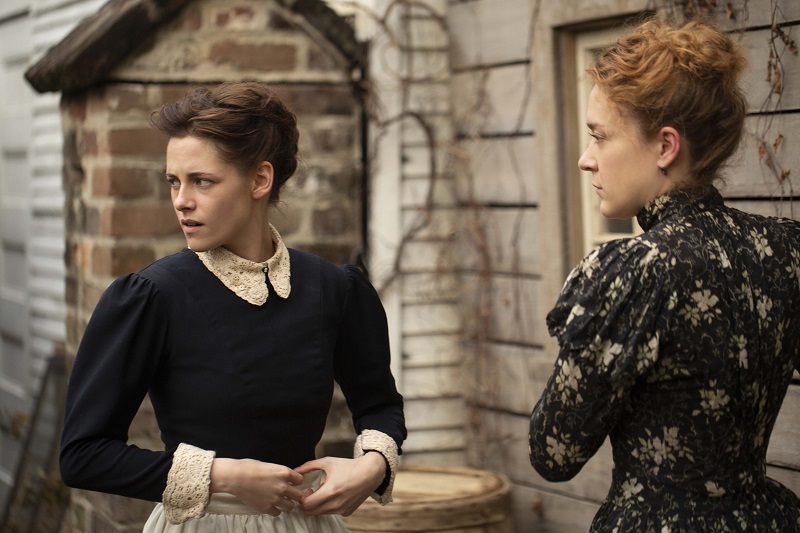Lizzie Borden’s notorious story comes to the screen with a fresh twist and in the process exposes a new generation to the shock and awe that is Lizzie, starring Chloe Sevigny as the infamous accused murderer.
The Bordens were one of the wealthiest families in New England in the late 1800s and Lizzie was the family’s youngest. On August 4, 1892 someone took an axe to Borden’s father, Andrew (Jamey Sheridan), and her stepmother, Abby (Fiona Shaw). After a quick investigation, authorities in Fall River, Massachusetts determined that despite having a witness saying otherwise, Lizzie was the culprit. That eyewitness was a house maid, Bridget Sullivan (Kristen Stewart), an Irish native who—according to this account of events—was having an affair with the accused.
The casting in director Craig William Macneill’s slow burn is immaculate. Sevigny could not have been a better choice and this character is so firmly in her wheelhouse. Stewart, who has been brilliantly stretching her acting wings since busting free of Bella Swan and the world of Twilight, is simultaneously compelling, riveting and innocently ensnarled into Lizzie’s dramatic dilemma.
See, as painted in Bryce Kass’ script, Andrew was not the kindest of fathers… or gentlemen for that matter. He routinely forced himself on Sullivan and berated his youngest daughter for pretty much everything she did. As for Lizzie’s stepmother Abby, she was equally complacent about the goings-on in the home in this version of the first of America’s “crimes of the century.” Then again, many women of that period would never speak up against their husbands. She didn’t care for it in the slightest but was helpless to stop her husband’s advances on their house maid and his constant criticism of Lizzie.
The accused’s older sister, Emma Borden (Kim Dickens), valiantly tried to get her little sis to conform to father’s wishes and expectations of them, to no avail. Lizzie was determined to blaze her own path and even though she was getting up there in age and suffered from seizures that would happen in public, the youngest Borden refused to change her ways in hopes of finding a husband. Was she a lesbian? History has given mixed messages to that rumor, but Kass paints a picture that feels like fact and adds a riveting layer to the overall tale that richly complicates the Borden murders due to Andrew catching his daughter having sex with the house maid—further enriching his disdain for his youngest child.
Lizzie moves along at a pace that brilliantly reflects the era. It is a suspenseful journey, cinematically, if for no other reason than we all know exactly how this family story will end—with the brutal execution of two souls. With the gifts of Sevigny and Stewart, we hang on every word and action. What happened on that fateful day in 1892 is still to this day considered an unknown. What is utterly fascinating in Macneill’s film is how—even though history has informed us of what occurred in Fall River, Massachusetts—it remains a mystery. The helmer shows us exactly what happened to Andrew and Abby and leaves no doubt as to who the killer is. The jury in that trial determined that there is no way that a woman of that station in society could have possibly have committed such a gruesome act. Lizzie was set free.
Through Kass’ script, everything is wrapped up in a neat (albeit bloodied) bow and it leaves a resonant feel that is slightly unsettling. That is firmly on purpose. It is shown that there were complicated elements in this familial setting that could spur someone to murder. Lizzie felt her potential inheritance was at risk due to her father’s being naively played by his brother, her uncle. The shame of the lesbian affair was another spoke in a wheel that with the fragile mind of Lizzie, could also result in something truly horrific.
Why it all works so well is the direction of Macneill, who employs a true laissez faire method of helming when it comes to his lead actresses. They grab the reins of this story and take the audience for a ride that is simultaneously subtle and a searing indictment of how women were treated in the 1800s. Stewart continues her surge into the lexicon of great young actresses whose talent only seems to be growing as her films come and go from theaters. One almost feels as if Sullivan is a tragic soul, doomed to spend her days haunted by the events of August 4, 1892.
Meanwhile, as played by Sevigny, Lizzie is a trailblazer whose trail was torched by society, the era and most importantly her father and step-mother. The depths the actress goes in her depiction is intense. She too has brilliantly segued from teen actress to fully mature thespian who wields her acting gifts with such firm control, it is utterly impressive.
Lizzie may feel a bit slow to some, but if you can let yourself fall back into the pace of life of the late 1800s, as the film crescendos, it will be an experience that will stay with you for some time. A sign of a true story’s resonance is, if, upon its conclusion, one delves deeper to discover more information about the subject. That is exactly what occurred the moment the credits ceased. Lizzie will raise more questions than it answered, but in the best of ways.
Grade: B+



